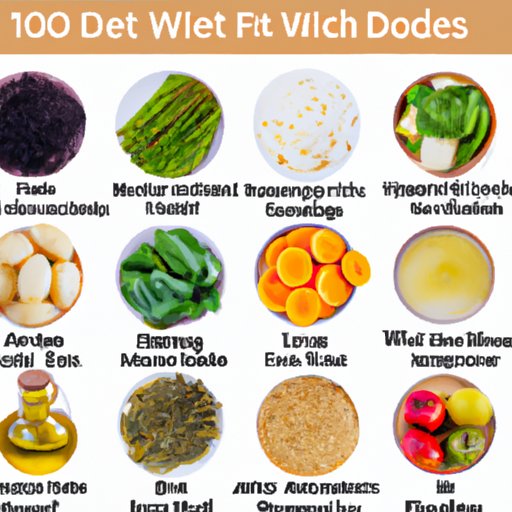
Introduction
Weight loss is a common problem that many people face, and there are a variety of ways to approach it. However, many people prefer to avoid the use of artificial means to lose weight and opt for natural solutions to help shed those extra pounds. In this article, we will explore several natural ways to lose weight and offer practical tips on how to implement them into your daily routine.
Top 5 Natural Supplements to Aid Weight Loss
Natural supplements can provide a beneficial boost when trying to lose weight. Here are five of the best supplements to consider:
Green Tea Extract
Green tea extract is a popular ingredient in many weight loss supplements due to its antioxidant and fat-burning properties. The active ingredient in green tea, Epigallocatechin gallate (EGCG), has been shown to increase metabolism and promote fat oxidation. However, it is essential to note that high doses of green tea extract may cause liver damage, so it is crucial to stick to recommended doses.
Caffeine
Caffeine is a stimulant that provides energy and can also suppress appetite. When consumed in moderation, caffeine can be an excellent addition to a weight loss routine. However, excessive caffeine intake can lead to negative side effects like nervousness, jitters, and insomnia.
Fiber is an essential nutrient in a healthy diet and can help regulate digestion and maintain a healthy weight. Fiber supplements, like glucomannan, can help reduce appetite and calorie intake. It is crucial to take fiber supplements with plenty of water to prevent gastrointestinal issues.
Chromium is a mineral that can help regulate blood sugar levels, which can lead to decreased appetite and weight loss. However, while the supplement is generally considered safe, high doses may lead to kidney damage and stomach problems.
CLA is a fatty acid naturally found in animal products like meat and dairy. Taking CLA supplements can increase fat loss, improve body composition, and support immune system function. However, like the other supplements, excessive intake can lead to side effects like diarrhea, stomach discomfort, and insulin resistance.
How Drinking Water Can Help You Lose Weight
Water is essential for overall health, and it can provide significant benefits for those seeking to lose weight. Here are a few ways drinking water can help you shed pounds:
Increases Metabolism
Drinking water can help increase the body’s metabolic rate, which is the rate the body burns calories. Drinking water before meals can help the body burn more calories during digestion, aiding in weight loss.
Reduces Appetite
Drinking water can help reduce appetite and prevent overeating. Often, the body may mistake hunger for thirst. By staying adequately hydrated, individuals can reduce the number of unnecessary calories consumed throughout the day.
Practical Tips for Drinking More Water
Here are a few tips to help increase water intake:
- Carry a reusable water bottle with you throughout the day.
- Flavor water with fruits like lemon or cucumber for added taste.
- Set reminders on your phone to drink water at regular intervals.
- Drink a glass of water before every meal.

10 Foods to Add to Your Diet for Weight Loss
Eating a healthy diet is essential for weight loss and overall health. Here are ten healthy, low-calorie foods that can aid in weight loss:
- Spinach: Low in calories and high in nutrients such as vitamins A and C, fiber, and iron, spinach is an excellent addition to any weight loss diet.
- Green Beans: High in fiber and low in calories, green beans can provide a feeling of fullness and aid in weight loss.
- Salmon: Packed with omega-3 fatty acids and lean protein, salmon is a healthful food that can suppress appetite and increase metabolism.
- Broccoli: Packed with fiber and vitamins, broccoli is an excellent option for weight loss and satiety.
- Chickpeas: High in protein and fiber, chickpeas can help reduce hunger and aid in weight loss.
- Avocado: Avocados are rich in healthy fats and fiber, making them an excellent option for weight loss and appetite regulation.
- Eggs: High in protein, eggs can help control appetite, increase metabolism, and provide essential nutrients.
- Quinoa: Quinoa is high in protein and fiber, making it an excellent option to keep you feeling full and satisfied.
- Greek Yogurt: An excellent source of calcium and protein, Greek yogurt can help you feel full and suppress your appetite.
- Berries: Packed with antioxidants and low in calories, berries are a healthy alternative to sugary snacks and can help regulate appetite and blood sugar levels.
Why Exercise is Key to Losing Weight
Exercise is essential for overall health and can be beneficial for weight loss. Here are a few ways exercise can help in weight loss:
Increase Metabolic Rate
Exercise can increase metabolic rate, which is the rate the body burns calories. Weight training can also help build muscle, which can increase metabolism and promote weight loss.
Aids in Calorie Burning
Exercise can help burn calories, making it easier to maintain a calorie deficit necessary for weight loss. Cardiovascular exercises like running, cycling, or swimming can also benefit heart health.
Practical Tips for Incorporating Exercise into Daily Routines
Here are a few tips to help incorporate exercise into your daily routine:
- Choose an activity you enjoy, like hiking or dancing, to make exercising fun and enjoyable.
- Set aside a specific time to exercise each day, and make it part of your daily routine.
- Find a workout buddy to keep you motivated and accountable.
- Make small changes, like taking the stairs instead of the elevator, to increase physical activity throughout the day.
How to Create a Healthy Meal Plan for Weight Loss
Meal planning is essential for weight loss success. Here are a few tips for creating a balanced meal plan:
Consider Caloric Needs
It is crucial to consume fewer calories than your body uses to create a calorie deficit that promotes weight loss. Consult a healthcare provider to determine your caloric needs and set realistic weight loss goals.
Incorporate Nutrient-Dense Foods
Eating foods rich in vitamins, minerals, and fiber can help promote overall health and aid in weight loss. Focus on incorporating vegetables, fruits, lean proteins, and healthy fats into the meal plan.
Mindful Eating
Practice mindful eating to decrease overeating and improve the enjoyment of food. Savor each bite and eat slowly to allow time for the brain to signal fullness.
Why Tracking Your Calories Can Help You Lose Weight
Tracking calories is essential to stay on track with weight loss goals. Here are a few reasons why:
Keeps You Accountable
Tracking calories can help keep you accountable for your food choices and aid in making healthier choices. It creates awareness of what is being consumed and encourages mindful eating.
Monitors Progress
Tracking calories allows individuals to monitor progress and adjust accordingly to reach weight loss goals. It helps identify habits or behaviors that may be preventing weight loss.
Practical Tips for Tracking Calories
Here are a few tools and tips for tracking calories:
- Use smartphone apps like MyFitnessPal or LoseIt to easily track calories.
- Invest in a food scale to get precise measurements of portion sizes.
- Track calories for a couple of weeks to understand eating patterns and make healthier choices.
- Use online calorie calculators to determine caloric needs.
Conclusion
Weight loss is a challenging journey, but with supportive tools and natural remedies, it can be done. With the supplements, foods, exercise tips, meal planning advice, and calorie tracking tools mentioned in this article, individuals can approach weight loss naturally and healthily. Remember, weight loss is a personal journey, so take the time to find solutions that work best for your unique body and lifestyle.





